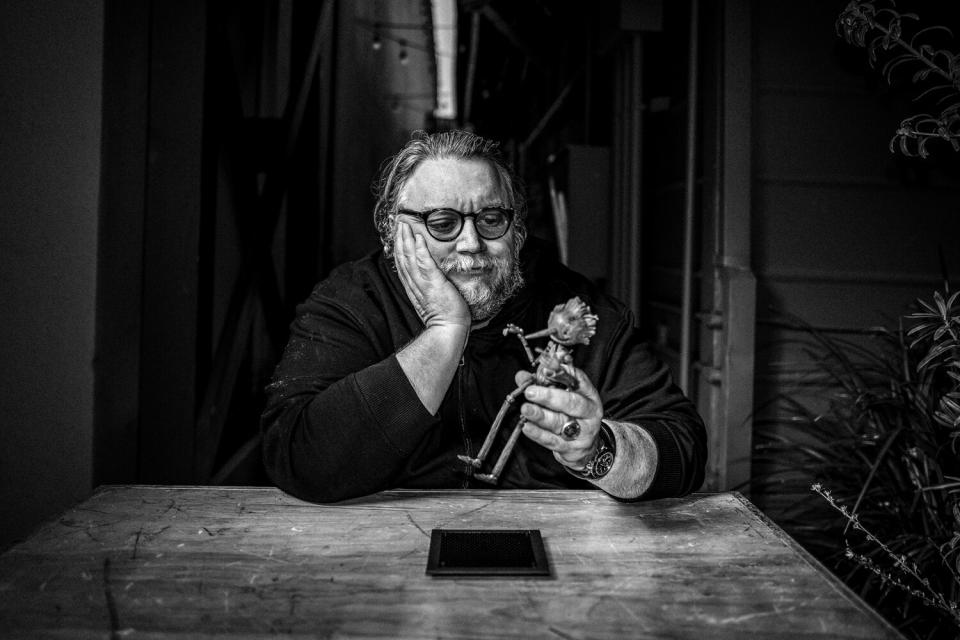Guillermo del Toro's Pinocchio character is 'recruited' by Italian fascists before World War II

- Oops!Something went wrong.Please try again later.
Guillermo del Toro is transforming Pinocchio from a lovable wooden boy to a (temporary) boy soldier in his new film adaptation of the classic fantasy tale.
"He is recruited into the village military camp, because the fascist official in town thinks if this puppet cannot die, it would make the perfect soldier," the Oscar winner told Vanity Fair of his upcoming stop-motion-animated Pinocchio film. The Shape of Water helmer's predictably unnerving take is set against the rise of fascism in pre-World War II Italy, in a village where a foreboding officer (voiced by Ron Perlman) "politically and socially" controls the area.
Whereas Disney's 1940 version of Pinocchio (and the studio's own cinematic remake starring Tom Hanks) takes place in a dreamlike world, del Toro chose to root his film in reality, with the whimsical tale unfolding "in an environment in which citizens behave with obedient, almost puppet-like faithfulness."

mandraketheblack.de/NETFLIX Guillermo del Toro poses with a 'Pinocchio' puppet for his stop-motion animated Netflix movie.
The filmmaker added that, in addition to being inspired by the turmoil in Europe between World War I and World War II, he drew connections between the character and the monster in Mary Shelley's Frankenstein.
"They are both about a child that is thrown into the world," del Toro told Vanity Fair. "They are both created by a father who then expects them to figure out what's good, what's bad, the ethics, the morals, love, life, and essentials, on their own. I think that was, for me, childhood. You had to figure it out with your very limited experience."
These ideas have been bouncing around del Toro's mind for a decade. Back in 2012, the director made the connection between Pinocchio and Frankenstein during an interview with EW. "They are both journeys of understanding, and journeys of evolution of the spirit," he said at the time. "When we started working on Pinocchio we knew very clearly that we wanted to make it different in the sense that it is not just a fairy tale but a fairy tale that actually moves you and emotionally affects you. It deals with ideas that are relevant to everyone, to all mankind in a way."
Despite the dark dressings, del Toro maintained to Vanity Fair that the film was made to be family-friendly and accessible to a wide range of ages.
"These are times that demand from kids a complexity that is tremendous," he said. "Far more daunting, I think, than when I was a child. Kids need answers and reassurances.… For me, this is for both children and adults that talk to each other. It tackles very deep ideas about what makes us human."
Cate Blanchett, who starred in del Toro's 2021 Oscar-nominated noir Nightmare Alley, joined Pinocchio in a voice role as a monkey named Sprezzatura after the director offered her the part on the set of their prior collaboration.
According to the performer, del Toro told her, "You are not this mysterious woman. You are a really cheeky, naughty 12-year-old boy."
"And so he said, 'Why don't you play the monkey?'" Blanchett added in a January interview on SiriusXM's The Jess Cagle Show. "I dunno. I don't have any words. I just make monkey noises for two hours... So, yeah, that was fun."
Pinocchio — also featuring the voice of Ewan McGregor as Sebastian J. Cricket, who lives in the wooden boy's heart — debuts in December on Netflix.
Hear more on all of today's must-see picks on EW's What to Watch podcast, hosted by Gerrad Hall.
Related content:

